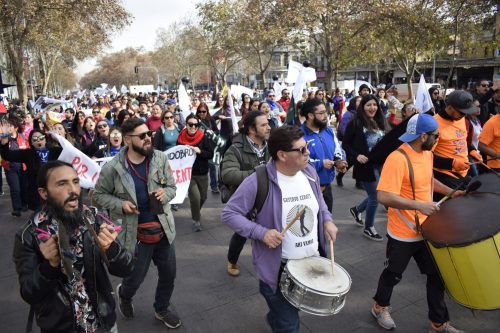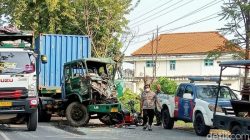What you need to know:
The striking teachers have pledged never to return to class until their grievances are addressed
The majority of Arts students at various government-funded educational institutions across the country are staring at blackboards while their teachers continue to abandon their duties to engage in the ongoing industrial action regarding a pay raise. On Tuesday, humanities teachers officially went on strike in response to what they described as an unfair salary policy introduced by the government. The industrial action, led by the Uganda Professional Humanities Teachers Union (UPHTU), mainly affects government secondary schools, 23 Primary Teachers’ Colleges, five National Teachers’ Colleges, and Uganda Colleges of Commerce.
What the teachers say
The striking teachers have pledged never to return to class until their grievances are addressed. Mr Yoram Muzahura, the head teacher of Muntuyera High School in Ntungamo District, told the Daily Monitor in an interview yesterday that “The situation is not okay and the Arts students are not studying. We are not sure when the strike is going to end.” The head teacher of Rukore High School in Kabale District, Mr Joseph Akakwasa, confirmed that the ongoing industrial action has affected students’ learning. He said all 13 Arts teachers at his school have put down their tools. Mr Akakwasa advised the government to cease issuing threats and instead focus on valuing the contributions of the aggrieved teachers. The head teacher of Mbarara Secondary School, Mr Godfrey Ahimbisibwe, said “I don’t have the right to give orders to Arts teachers to come and teach because they have their rights and they know what they want now.”
Mr Godfrey Osenda, the national chairman of Uganda Professional Humanities Sacco, said over 10,000 of their 17,000 members on the government payroll have signed on to participate in the ongoing strike. Mr Praise Twebaze, UPHTU’s treasurer for Kigezi Sub-region, criticised the government’s decision to favour Science teachers in its salary policy. “We want our salaries enhanced. Period,” said Mr Twebaze. At Kihanga Secondary School, no humanities lessons were conducted on Tuesday, according to the head teacher, Mr Onesmus Rukundo. “So, what do you expect at the end of the term or year?” he asked. The UPHTU coordinator for the Greater Kabale Area, Mr Wilber Ayebare, described the current treatment of arts teachers as “disrespectful and discouraging”. In the Lango Sub-region, the situation is the same. School administrators interviewed by this newspaper indicated that the aggrieved teachers have absconded from duty.
Mr John Michael Elweu, UPHTU Lango region’s coordinator, said all three engagements they had with the Public Service and the Ministry of Education and Sports over the issue of pay rise were unsuccessful. “They told us to wait for the 2026/2027 financial year. We have waited for a long time, and that is why we are now home,” he said. Mr Robert Apita, UPHTU’s regional secretary for Lango, also a teacher at Fr Aloysius Secondary School in Kole District, said their strike would only come to an end after their salary is enhanced. “Even if it takes a week, a month, or it goes for the whole term, I will be there to support the affected teachers in their industrial action,” Mr Apita said. Mr Daudi Anguako, a teacher in Arua District, said: “We have been patient with the foolery of the government. Why are they toasting us?” He castigated the regime: “During Obote’s or Amin’s regime, such discrimination never existed.
What is special about being a science teacher anyway? All teachers deserve fair treatment,” said Mr Anguako. The deputy head teacher of Kuru Secondary School in Yumbe District, Mr Jackson Andabati, said the ongoing industrial action hurts the learners because it affects syllabus coverage. He said the disparity in the salary affects the performance of the teachers because many have lost morale to work. He suggested that there is a need for the government to listen to the cry of the Arts teachers and increase their salary. However, at Barakala Seed Secondary School, all the Arts teachers have joined the industrial action, according to the school head teacher, Mr Hamid Amin. “We only have science teachers who are trying to cover their periods. We are worried about the duration the industrial action is going to take as this will affect syllabus coverage,” he said.
Mr Saul Rwampororo, Ntare School head teacher, said: “There is no Arts teacher on government payroll at the school. However, we have private teachers who are currently helping students.” Ms Maurine Nuwagaba, the head teacher of Bukiro Seed School in Mbarara, said the situation is the same across the district. Mr Samuel Atukunda, the head teacher of Nakivale Secondary School in Isingiro District, said they are negotiating with their Art teachers not to go on strike for the good of their learners. Mr Daniel Tumwesigye, a retired educationist from Mbarara City, urged the government to address the Arts teachers’ concerns. “Striking does not mean not going to class only. You can be in class but not teaching. The students are the ones that will be affected,” he explained. In Busoga Sub-region, the industrial action has not spared government-aided schools and institutions of learning.
Mr Joseph Ojiambo Ogenya, the deputy head teacher of Buhemba High School in Namayingo District, said: “As we speak now, I and other Arts teachers are at home. Ms Kevin Akello, chairperson of the Soroti Arts Teachers Association, said will only return to class when the government through the Ministry of Education addresses their concern. Mr George Mooma, the Elgon regional coordinator and chairperson of UPHTU, explained: “We are not talking about enhancement but advocating for equal pay but some teachers have always betrayed us by going to schools.” Mr Hassan Kaka, UPHTU general secretary in Elgon Sub-region, disclosed that most of the head teachers in government schools are supporting their move but fear losing their jobs. Mr Gerald Simiyu a teacher of history and economics at Bubulo Girls’ Secondary School in Manafa District, asked the UPHTU executive members to have an engagement with school head teachers if the ongoing strike is to have a positive impact.
Wakiso District differs from the rest
Nonetheless, in Wakiso District, the situation was different as of June 11. Mr Fredrick Kiyingi, Wakiso District education officer, said they were able to convince the aggrieved teachers not to take part in the industrial action because the government would soon handle their issues. Mr Mudathir Lutale, the head teacher of Naggulu Seed Secondary School in Wakiso District, confirmed. “We are dealing with vulnerable children, some of whom cannot afford to buy enough books, and laying down tools would be a disservice to them,” he said. He added: “We have an enrollment of over 1000 students who trek long distances to access education services. We are trying to create a good working relationship with our teachers, encouraging them to stick to their profession as we wait,” he said. At Kasaali Seed School in Kyotera District, the strike has affected the students who have just reported to the new learning institution.
Mr Lawrence Ssekyondwa, the Kyotera District education officer, said as a district, they were still struggling to ensure that the teachers who were posted to Kasaali Seed School by the Ministry of Education in May, report for duty. Mr Robert Baliita, Kasaali Seed School head teacher, said: “We pray that higher authorities intervene and see our learners get the required service as our enrollment increases.” The head teacher of Semuliki High School, Mr Ddungu Esau, also the chairperson of UPHTU in Bundibugyo, said: “It’s only me and my deputy present at the school. Our fellow Arts teachers are at home. To my surprise, these science teachers who are earning a lot are rarely at school.”
Background
The teachers want their salaries raised to match those of Science counterparts and head teachers. Arts teachers are demanding Shs6.5m for head teachers, Shs4.5m for deputy head teachers, Shs4m for graduate teachers, and Shs2.2m for diploma holders.
Compiled by Bill Oketch, Emmanuel Arineitwe, Simon Peter Emwamu, Robert Muhereza, Julius Byamukama, Cosline Nakahiira, Jovita Kyarisiima, Al Mahdi Ssenkabirwa, Noeline Nabukenya, Ambrose Musasizi, Annex Kanshabe, Derick Wenani, Fred Wambede, Rajab Mukombozi, Felix Warom Okello, Clement Aluma and Robert Elema, Abubaker Kirunda, Tausi Nakato & Longino Muhindo
Stay updated by following our
WhatsApp
and
Telegram
channels;
Daily Monitor Telegram channel
Daily Monitor WhatsApp Channel
Provided by SyndiGate Media Inc. (
Syndigate.info
).







